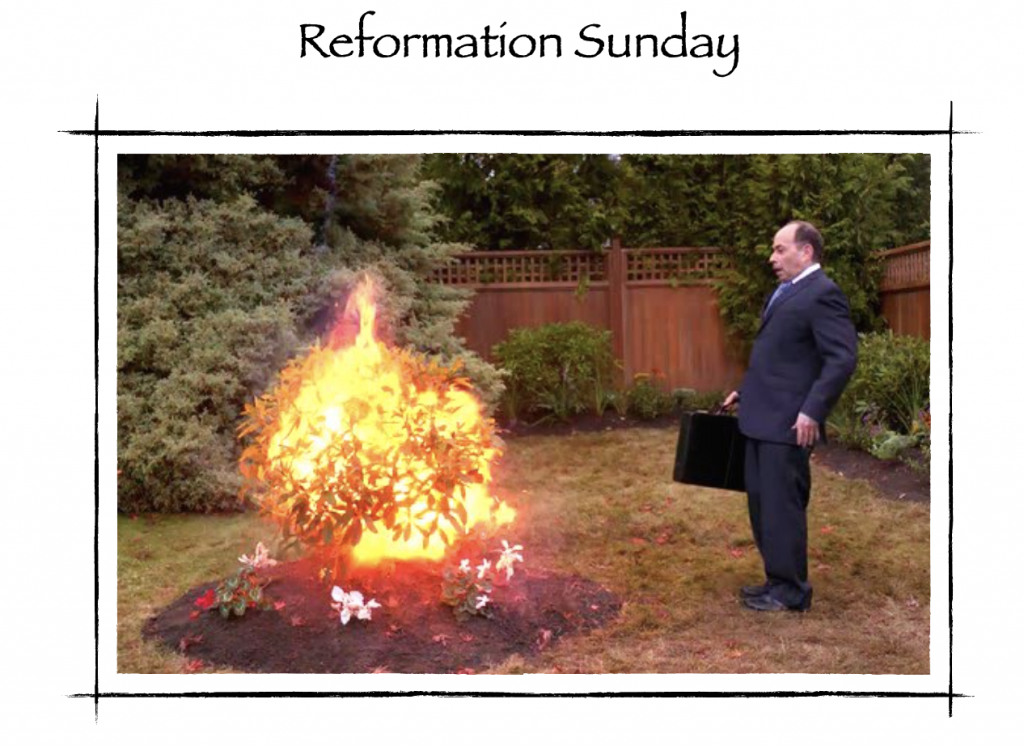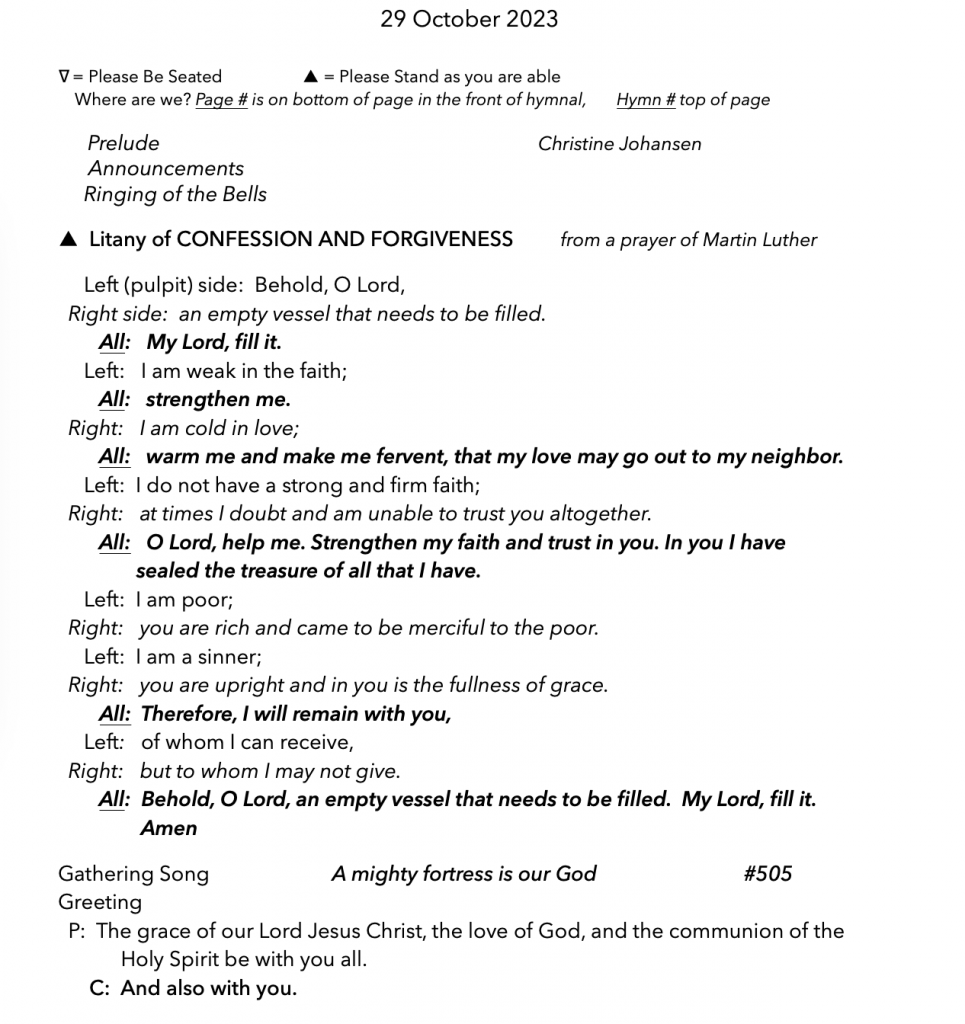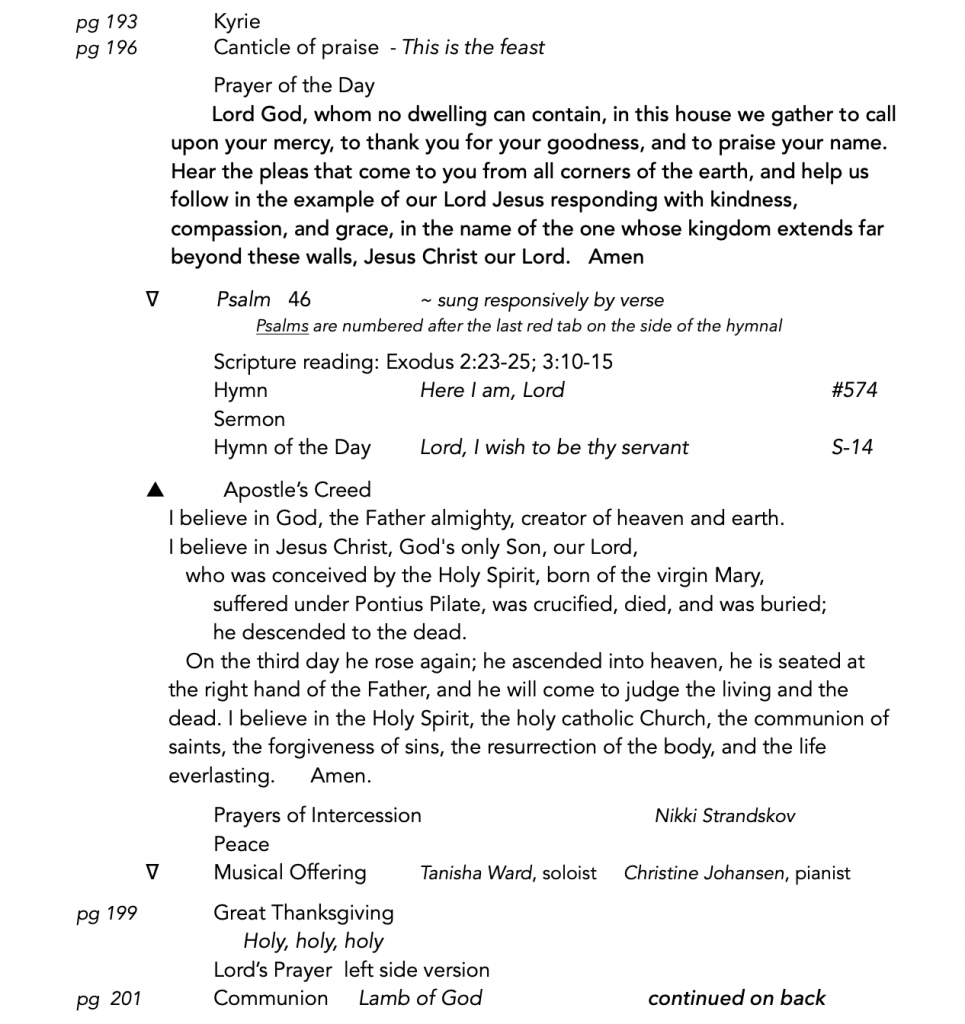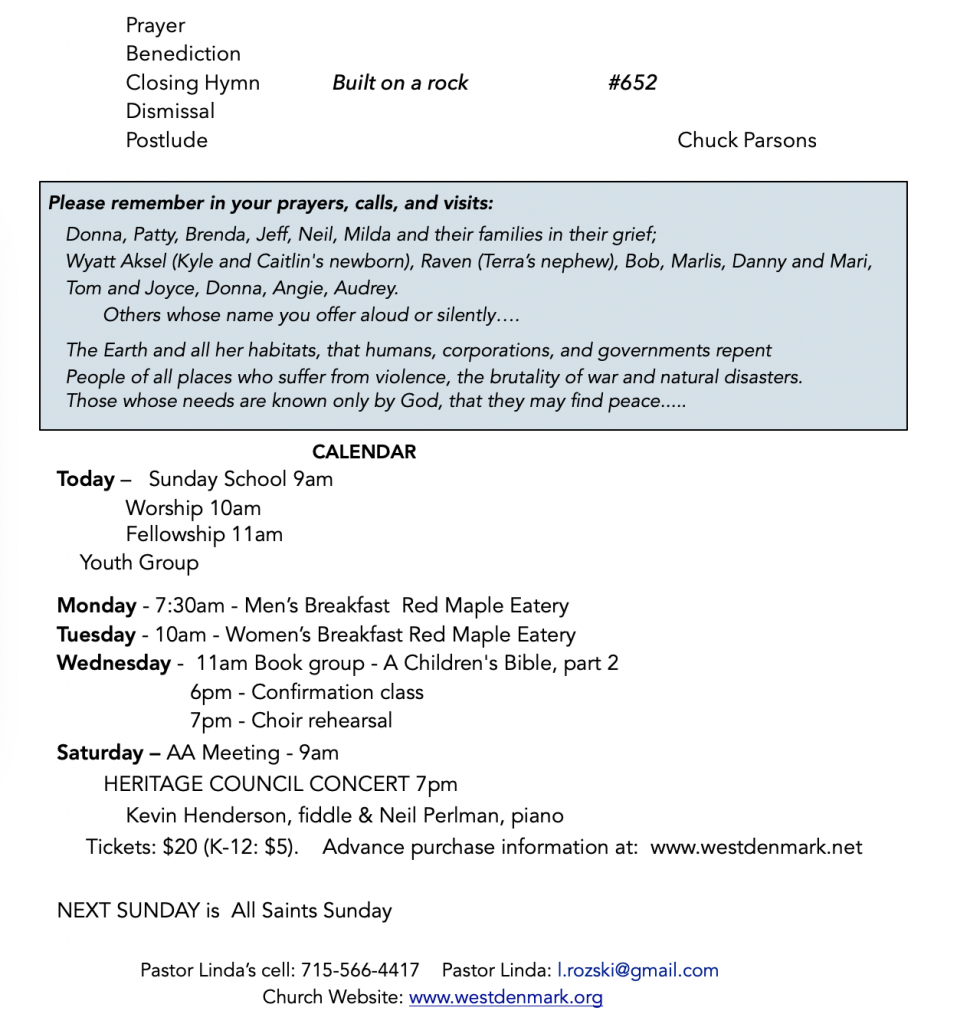



A lot has happened since we left Jacob last week.
Because I have tarried so long in Genesis, I’m going to skip over the long story of Jacob’s family and how they ended up in Egypt.
The book of Exodus begins several generations later, when trouble is brewing for Jacob’s quickly multiplying descendants. A new pharaoh has come to power who fears the foreigners. He makes slaves of all these once-honored guests, forcing them to build grain storage cities for his profit. He does not seem to realize that his cruelty will ensure the very thing he most fears.
Three short readings from Exodus, from chapters 1, 2, and 3 (1:8-14; 2:3-10; 3:1-12)
1:8 “Now a new king arose over Egypt, who did not know Jacob’s son, Joseph. The king said to his people, “Look, the Israelite people are more numerous and more powerful than we. Come, let us deal shrewdly with them, or they will increase and, in the event of war, join our enemies and fight against us and escape from the land.” Therefore they set taskmasters over them to oppress them with forced labor. They built supply cities, Pithom and Rameses, for Pharaoh. But the more they were oppressed, the more they multiplied and spread, so that the Egyptians came to dread the Israelites. The Egyptians became ruthless in imposing tasks on the Israelites, and made their lives bitter with hard service in mortar and brick and in every kind of field labor.”
The pharaoh’s second move in the story is more violent and illogical than the first — he decides to kill off his future slave force, all the male babies who would otherwise grow up to work for him. The Hebrew midwives he recruits to carry out his plan, telling them to kill the babies at birth, ignore him. When summoned for questioning, they offer explanation wrapped in insult: “The Hebrew women are not like Egyptian women. They are strong. They give birth before the midwife arrives.”
Into this conflict Moses is born: his mother hides her newborn son for three months.
Chapter 2:3 “When she could hide him no longer she got a papyrus basket for him, and plastered it with bitumen and pitch; she put the child in it and placed it among the reeds on the bank of the river. His sister stood at a distance, to see what would happen to him. The daughter of Pharaoh came down to bathe at the river, while her attendants walked beside the river. She saw the basket among the reeds and sent her maid to bring it. When she opened it, she saw the child. He was crying, and she took pity on him. “This must be one of the Hebrews’ children,” she said.
Then his sister said to Pharaoh’s daughter, “Shall I go and get you a nurse from the Hebrew women to nurse the child for you?” Pharaoh’s daughter said to her, “Yes.” So the girl went and called the child’s own mother. Pharaoh’s daughter said to her, “Take this child and nurse it for me, and I will give you your wages.” So the woman took the child and nursed it. When her child grew up, she brought him to Pharaoh’s daughter, and she took him as her son. She named him Moses, “because,” she said, “I drew him out of the water.”
Thus the king fails to recognize that he is being thwarted not by boys growing into soldiers, but by five women acting from their instincts for courage and kindness – two midwives, a mother, a sister, and his own daughter all help save a baby who – one day, will set this enslaved people free.
Moses is neither fully Egyptian nor fully Hebrew, and eventually his dual status forces him to choose between safety and loyalty on the one hand, and justice on the other. He chooses justice, killing an Egyptian who was beating an Israelite slave. And, learning that his deed was witnessed, he flees to the land of Midian, where he befriends and marries into a priest’s family. Meanwhile, the pharaoh dies, but the living conditions for the Hebrew people remain intolerable.
Chapter 3:1 “Moses was keeping the flock of his father-in-law Jethro, the priest of Midian; he led his flock beyond the wilderness, and came to Horeb, the mountain of God. There the angel of the Lord appeared to him in a flame of fire out of a bush; he looked, and the bush was blazing, yet it was not consumed. Then Moses said, “I must turn aside and look at this great sight, and see why the bush is not burned up.” When the Lord saw that he had turned aside to see, God called to him out of the bush, “Moses, Moses!” And he said, “Here I am.” Then he said, “Come no closer! Remove the sandals from your feet, for the place on which you are standing is holy ground.” He said further, “I am the God of your father, the God of Abraham, the God of Isaac, and the God of Jacob.” And Moses hid his face, for he was afraid to look at God. Then the Lord said, “I have observed the misery of my people who are in Egypt; I have heard their cry on account of their taskmasters. Indeed, I know their sufferings, and I have come to deliver them from the Egyptians, and to bring them up out of that land to a good and broad land, a land flowing with milk and honey, to the country of the Canaanites, the Hittites, the Amorites, the Perizzites, the Hivites, and the Jebusites. The cry of the Israelites has now come to me; I have also seen how the Egyptians oppress them. So come, I will send you to Pharaoh to bring my people, the Israelites, out of Egypt.” But Moses said to God, “Who am I that I should go to Pharaoh, and bring the Israelites out of Egypt?” God said, “I will be with you…..”
Hymn #574 Here I am, Lord
These passages provide the iconic Sunday School scenes of baby Moses floating in a basket, life in the Pharaoh’s palace, the burning bush and the revelation of the mysterious, untranslatable, unutterable name of God. As prominent as these scenes are, however, the key to the passage is God’s self-revelation as the kind of deity who hears the people’s misery and responds. For the rest of the biblical narrative, this is the God who “has brought you up out of the land of Egypt.” And for the rest of the biblical narrative, Israel is the people delivered from oppression, the people who are to remember and recall the mighty acts of God.
But Moses, standing barefoot before the mysterious and fearfully fascinating bush doesn’t yet know this. With good reason, he questions the call. “Who am I to go, who am I to do this thing? I am a shepherd, for goodness’ sake – I was an adopted son of the oppressor, I’m a murderer on the lam, I have this speech impediment. Why in the world would you send me — back there!? Surely there is someone else…there has to be someone else…”
God’s response is to counter Moses’ objections and move directly to the promise that God will be with him. And Aaron will go, too. I bet that wasn’t the kind of comfort Moses was looking for. Illustrated children’s Bibles and religious art depict the bush, the theophany, the presence of God that is purely speculative. I think we can all imagine the stricken face of a terrified Moses. The artwork doesn’t show that even though the dialog strongly hints at it. Perhaps it is to give Moses his dignity. His fear is something we’d rather not notice, knowing as we do, the leader he becomes.
“I will be with you” is not at all the same as, “I will do this for you.”
“I will do this for you” isthe kind of God we want to have, the kind of church we want to be part of, the kind of life we want to live. We want the God who goes there for us, into the danger and valley of death, the God who acts with might on our behalf, who acts — so that we don’t have to. That’s what we want and expect from God, isn’t it? Especially on this side of the crucifixion of God’s son, the once and for all – doesn’t that apply to every situation? If God can create the entire world and all that is in it, can’t God end oppression and violence and hunger without Moses’ help, without our input, without my involvement? It seems a ridiculous proposition, that somehow we are required to assist, or worse yet, that it is our calling to do it, that you are to be the one who is to go, to act in God’s stead. Yet, over and over, that is the message this God delivers: “Go, I will be with you.”
You have to know by now, that I am a homebody, one who wants to stay put, to dig in, to honor roots. Maybe you’re like that, too. So I find this an unsettling theme, and I wonder what, if anything, it implies for those who stay.
Adam and Eve – standing barefoot in the garden – were clothed replacing their fig leaves with more wearable garments and were shown the door. “Out you go. Go tend and till the earth out there, contend with the dust from which you came. You can’t stay here anymore, but do not fear, I will go with you.”
Caught in the murder of his brother, Cain feared for his life, but God sent him away saying, “I will be with you.”
Abraham and Sarah received the word of God, “Go from your father and your mother’s home to the land that I will show you.” Hagar and Ishmael were banished from Abraham’s camp, but God found Hagar reassured her that Ishmael would thrive and said, “I will be with him.”
Now again with Moses – “Go”…. there are objections…bargaining…. but “No, Go, and I’ll be with you.”
It’s an uncomfortable message. We can’t stay in Eden, we can’t stay at home, we can’t stay hidden safely away wrapped in a robe and slippers reading the Sunday paper about the world outside our door. “No, but Go, and I’ll be with you.” It doesn’t promise that things will be easier, that an aura of safety or peace will surround us. It isn’t a message intended to comfort us, but is intended to show us the holy work, the human need, and connect the dots.
“Letting go and letting God” is a modern slogan that is very helpful in recovery, but wasn’t available to Moses. It completely misses the terror and anguish of being held in God’s presence. It implies that God will do it for you, take care of you, make your troubles disappear. It short-circuits the Agony and Ecstasy of standing barefoot on holy ground and being commissioned for God’s purposes. God’s claim on their lives makes these ordinary people who became biblical characters braver than they could ever have realized at the time.
The age of prophets in the biblical model may have passed, but prophetic calling in our age is still a thing. God still afflicts the comfortable conscience for the task of comforting the afflicted. The biblical word sending us out is still the way God works. We are called to be euanglion, messengers of the good news, critique-ers of culture, purveyors of justice, voices in the wilderness, companions to the underdog. We can’t stay in Eden or at home or hidden away and still consider ourselves to be Christian. Passivity and isolation and selfish personal comfort, complacency are not compatible life choices with the life of Christ or the calling of God. These ancient stories still have the power to convict us.
To Moses the prophet, God’s identity and purpose are revealed for the sake of easing human anguish. Elie Wiesel, a Jewish writer and Holocaust survivor, reminds us that the only thing that makes any difference in the world is that we should care about someone else enough to do something, to act, to speak. Indifference effects nothing and offers no hope. God declares to Moses, “My identity, my name will be manifest in my actions.” At the heart of this revelation of God is compassion for others, and this has shaped our Christian theological tradition – has altered the shape of Christian lives – perhaps even yours – ever since.
This is, as you know, Reformation Sunday, and it may seem an odd reading for the day. But, it’s not.
Reformation isn’t something simply to celebrate – to look back on as an origin story and say, “Yay!” Martin Luther believed the church of his day – and actually, the church of every day – needs to be in a constant process of re-formation. It begins with Liz’s favorite word, “discernment”, with holy imagination – in asking questions like, What are we about? How do we connect to God’s story or Christ’s invitation? Where are the needs in our local area, in our circles of influence? What do we need to let go of? What help do we need? If you sit quietly and open your mind, can you hear God say, Go? “Go do this hard thing, this compassionate thing. Go do this neighborly thing. Go out, beyond your self. I’ll go with you.”
Reformation is always about going, not staying. No living system or organism can stay the same. Change is essential to life, to a living faith, and to faithful living.
God is likely not calling to you grab you passport and go far away (even though the world-wide news is heart wrenching and compelling). Most of us won’t need to leave home. But, we might need to re-form priorities, or change attitudes, or ask real questions that can face us with complicated, challenging responses, or pluck up courage to be vulnerable and act even when we are afraid. Reforming the church is personal before it is institutional, it is an active, intensional desire to engage in God’s holy work.
“Go,” God says, “and believe this, I will be with you.”